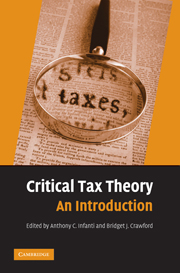Book contents
- Frontmatter
- Contents
- List of Illustrations
- List of Tables
- List of Contributors
- List of Common Abbreviations
- Introduction
- CHAPTER 1 FOUNDATIONS OF CRITICAL TAX THEORY
- CHAPTER 2 HISTORICAL PERSPECTIVES ON TAXATION
- CHAPTER 3 THE GOALS OF TAX POLICY
- CHAPTER 4 CRITICAL TAX THEORY MEETS PRACTICE
- CHAPTER 5 RACE AND TAXATION
- CHAPTER 6 GENDER AND TAXATION
- CHAPTER 7 SEXUAL ORIENTATION AND TAXATION
- CHAPTER 8 THE FAMILY AND TAXATION
- CHAPTER 9 CLASS AND TAXATION
- CHAPTER 10 DISABILITY AND TAXATION
- CHAPTER 11 GLOBAL CRITICAL PERSPECTIVES ON TAXATION
- CHAPTER 12 CRITICAL PERSPECTIVES ON CRITICAL TAX THEORY
- Index
CHAPTER 5 - RACE AND TAXATION
Published online by Cambridge University Press: 04 August 2010
- Frontmatter
- Contents
- List of Illustrations
- List of Tables
- List of Contributors
- List of Common Abbreviations
- Introduction
- CHAPTER 1 FOUNDATIONS OF CRITICAL TAX THEORY
- CHAPTER 2 HISTORICAL PERSPECTIVES ON TAXATION
- CHAPTER 3 THE GOALS OF TAX POLICY
- CHAPTER 4 CRITICAL TAX THEORY MEETS PRACTICE
- CHAPTER 5 RACE AND TAXATION
- CHAPTER 6 GENDER AND TAXATION
- CHAPTER 7 SEXUAL ORIENTATION AND TAXATION
- CHAPTER 8 THE FAMILY AND TAXATION
- CHAPTER 9 CLASS AND TAXATION
- CHAPTER 10 DISABILITY AND TAXATION
- CHAPTER 11 GLOBAL CRITICAL PERSPECTIVES ON TAXATION
- CHAPTER 12 CRITICAL PERSPECTIVES ON CRITICAL TAX THEORY
- Index
Summary
The one area of critical tax theory that most obviously faces the hurdle of the myth of the “neutrality” of the tax laws is the intersection of race and taxation. Mainstream tax scholars are wont to point out that the tax laws are, on their face, race neutral. After all, we do not have one rate schedule for whites, another for African Americans, a third for Latina/os, and so on. The contributions to this chapter illustrate the fallacy of this myth of “neutrality,” underscore the importance of viewing tax through the lens of race, and, at the same time, nicely illustrate the influence that critical race theory and its methodologies have had on critical tax scholars writing in the area of race and taxation.
Deftly using the narrative voice in Tax Counts: Bringing Money-Law to LatCrit, Alice Abreu opens the chapter with “a lesson from Cuba” and an accompanying call to scholars interested in social justice to heed the importance of tax (and “money-law” more generally) as a site for battling subordination. Given her own experience, Abreu urges Latina/os to embrace the study of tax and to enter the tax field because of the diverse perspective that they can bring to this area of the law. To illustrate her point, Abreu identifies how her being Cuban and her immigrant background have shaped her general perspective on tax law and her specific scholarly contributions to the field.
Eschewing the controversial technique of personal narrative, the chapter's remaining contributors turn to statistics, social science research, and conventional legal analysis to explore the tax system through the lens of race.
- Type
- Chapter
- Information
- Critical Tax TheoryAn Introduction, pp. 107 - 108Publisher: Cambridge University PressPrint publication year: 2009
- 1
- Cited by

